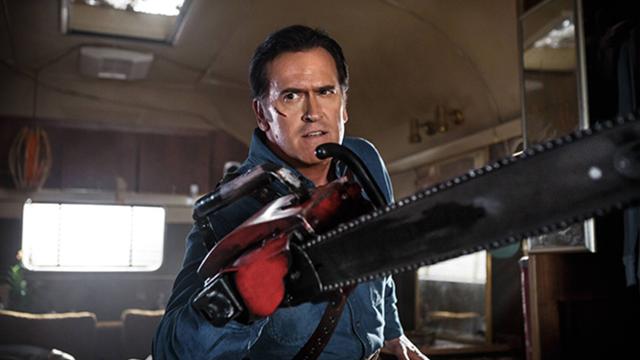In part one of our film industry kvetch sesh with Bruce Campbell, we covered the banality of superheroes, how Evil Dead changed over the years, and why Game of Thrones actress Emilia Clarke must be sick of green screens by now. This time around, we got to talk about his newest venture.
Campbell is hosting and executive producing the Travel Channel’s revival of Ripley’s Believe It or Not, a series that focuses on the superhuman feats of regular people. We also asked him about transitioning from acting to doc-style hosting, Ripley’s troubled history with cultural sensitivity, and the pitfalls of Hollywood.
Gizmodo: You have this new show for Travel Channel ” Ripley’s Believe It or Not. What appealed to you about a more documentary-style project?
Bruce Campbell: I started my ” I got my Screen Actors Guild card doing industrial films for Chrysler, teaching Chrysler car salesmen how to do stuff. And nobody would ever see them, like you’ll never see them. Like I have copies up, but nobody has them. But it trains you to work with a camera, and talk to the camera, rather than acting which is like this: You ignore the camera. Well, here it’s you…embrace the camera. So I’m really just going back to my roots 35 years ago.
When you’re a host, it’s tone. So our approach with this version of Ripley’s is get to know these people. You know, we can watch a lot of unusual stuff on the internet, type in whatever, but we want people to know who they’re dealing with.
And so my input, really, as an executive producer is to make sure that everyone gets treated with respect. There’s no “eww” factor. And because there’s a lot of people overcoming great trials ” so really, we’re sort of celebrating this. It’s the opposite of ” it’s not roadkill. I want to make sure it’s uplifting, not downgrading.
Gizmodo: I mean, historically, Ripley’s has gotten into a bit of trouble for some insensitivities, culturally. How did you guys avoid that?
Campbell: Well we’re we’re current with the times. [laughs]
Yeah. We don’t ” we’re here to honour everybody. And there’s a lot of people with decision makings that we wouldn’t have done. The guy who wanted to be a parrot, like physically become a parrot, to great, great degrees, and so ” maybe you wouldn’t be a parrot. Maybe I wouldn’t be a parrot. But let’s talk to the guy.
Gizmodo: And what compels somebody to do something like that”
Campbell: That’s why we’re ” we’re there to find out.
Gizmodo: That’s very interesting.
Campbell: So that’s our approach. Why? What’s ” what’s behind it? Because, you know when I was considering the show I’m like, “Let’s see some stories!” Because I wanted to see the quality of it. It’s good. It’s good. It’s like a real show.
Gizmodo: You’ve said before in the past that Hollywood reminds you of a ” like a girlfriend you can’t trust. Has this project been different from that?
Campbell: No.
Well, no, you know what it is, it’s not. It’s ” no. You meet good companies all the time. Travel Channel’s great. Ripley’s, very solid company, it’s been around for 100 years now. So, no, that’s all great.
It’s the ” it’s the business side of it that tends to blow. So it has nothing to do with anybody that I’m currently working for. I have worked with great companies and some schmoe companies, but I just don’t trust the business. It has nothing to do with the individual job.
Gizmodo: I think that’s fair.
Campbell: Because it’s a bit of a magnet for a bunch of… it’s the modern gold rush. “I want to be famous and rich.” So whenever you have an industry that dangles that in front of people, there’s a lot of people who will be drawn like moths to a flame. Soon to be burned and crash and fall into the ocean.
